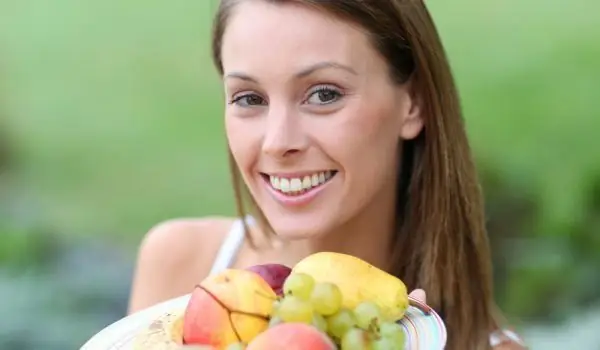2025 Author: Jasmine Walkman | [email protected]. Last modified: 2025-01-23 10:18
Cellulose is essentially a polysaccharide that enters the structure of plant cell membranes. Cellulose and pectin are neither energy sources nor building materials for the human body. But they have other advantages that are not to be underestimated.
Cellulose is not broken down by human digestive enzymes, but some intestinal bacteria produce an enzyme called cellulase, which breaks down cellulose into soluble substances that are partially processed in the lower parts of the digestive tract.
The main function of cellulose is to stimulate intestinal peristalsis. Cellulose has a lower effect on lipid and carbohydrate metabolism than pectins, but affects the motor function of the stomach and intestines.
Thus, on the one hand, it helps to reduce cholesterol and triglycerides, and on the other - to normalize impaired glucose tolerance in people with diabetes.
You should consume at least 30 g of cellulose per day. The main source of cellulose should be pasta and bread from standard flour, beans, baked potatoes, lentils, corn, salad vegetables, as well as fresh and dried fruits.

Broccoli, peppers, asparagus, tomatoes, cucumbers, cauliflower, lettuce - these are just some of the riches of vegetables, guaranteeing small amounts of calories and a significant source of cellulose.
Most ballast substances are contained in boiled wheat (40-50 g per 100 g of wheat), rye bread (6-8 g per 100 g of bread), wholemeal wheat bread (6-7 g per 100 g of product), raspberries (4-8 g per 100 g). fruit), blackcurrant (4g per 100g of fruit), peanuts (9-11 g per 100g of fruit). It is believed that women and the elderly consume more fiber than men and young people.
Keep in mind that as useful as it is for the human body, cellulose also has its side effects when "overdosed".
The vegetable cellulose of garden vegetables is tender and slightly irritates the gastrointestinal mucosa. Cucumbers, cabbage and lettuce contain coarser cellulose, which can cause complaints such as bloating, gas and increased abdominal pressure.
Recommended:
Foods Rich In Antioxidants

Foods that are rich in antioxidants are vital to our overall functioning. These "magic" foods not only improve our health, but also increase our vitality. They are the healthiest and most nutritious. Antioxidant is the name given to a group of elements that protect human cells from damage, usually caused by free radicals.
Foods Rich In Protein

Protein is a nutrient composed of amino acids that is necessary for the proper growth and functioning of the human body. While the body is capable of producing certain amino acids, essential amino acids must be derived from animal or vegetable protein sources.
The Iron-rich Foods We Need

The body needs iron. After all, every cell in the body contains iron and uses this important nutrient to help transport oxygen from the blood to the tissues and lungs. If iron levels are not optimal, the cells will not get enough oxygen and a person may become anemic.
Foods Rich In Fiber

You want to add more little fiber to the diet are you Fiber, along with adequate fluid intake, moves quickly and relatively easily in your digestive tract and helps it function properly. A high-fiber diet can also help reduce the risk of heart disease and diabetes.
Cleanse Your Body With A Diet Rich In Cellulose

The current diet is rich in cellulose and in addition to getting rid of excess weight goals and complete cleansing of the body of harmful substances accumulated in it after the inevitable consumption of harmful foods. The diet is high in cellulose and extremely low in fat.

